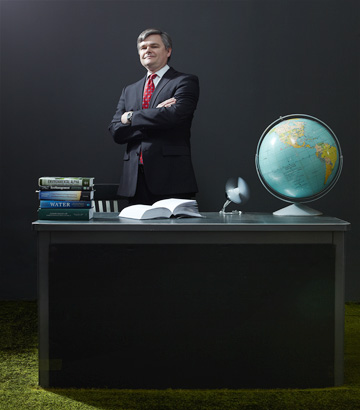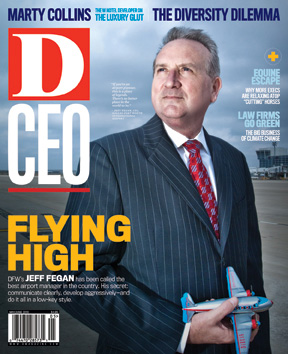Some wags have suggested that, given the amount of hot air that lawyers expel, it’s only fitting that the legal profession play a pivotal role in dealing with the challenges of climate change. From law schools adding seminars on the legal implications of global warming to major law firms creating climate change practice groups, the legal community is paying attention to the the topic—especially since the hot-button social issue is shaping up to be a lucrative field.
By 2008, more than a quarter of the “Am Law 100” firms had some form of a climate-change practice, and the numbers have continued to climb. Unlike some fleeting law firm trends—remember Y2K practice groups?—the heightened regulation of greenhouse gas emissions and an increased focus on renewable energy has created real legal work. Leading the way in doing that work are firms right here in North Texas.
One of those leaders is Thompson & Knight. The firm started its Climate Change and Renewable Energy Practice Group in 2007. Like most firms with such practices, there are few lawyers working exclusively on climate change-related legal issues. Instead, the group draws upon specialists in energy, tax, environmental, and corporate law.
Scott Deatherage, a Thompson & Knight partner who leads 25 lawyers in the firm’s climate-change group, says it’s important to take a multidisciplinary approach. “We have banking lawyers, tax lawyers looking at incentives, private equity lawyers involved in deals, transactional lawyers examining things like wind leases, and so forth,” he says.
Thompson & Knight has helped clients in Mexico, Brazil, the U.K., and Algeria with legal matters spawned by renewable energy. In 2008, the firm represented a Mexican company in one of the first international arbitrations involving a carbon-credit development project, which Deatherage describes as a “contractual dispute involving investment issues and a New York hedge fund.”
Such is typical of the work done by Deatherage’s group. Although the U.S. hasn’t ratified the Kyoto Protocol (which established a system in which carbon-restricted industrialized nations can trade greenhouse gas emission credits, or “carbon credits”), Deatherage says an increasing amount of his group’s time is spent advising clients on such carbon-credit projects. This includes companies looking to reduce their own carbon footprint, as well as those entering the voluntary U.S. carbon credit-market. For one such Fortune 500 client, Thompson & Knight was involved in negotiating a voluntary climate-change agreement with both the Environmental Protection Agency and the White House Climate Change Task Force. With other clients, including developers in countries like Costa Rica and India, Deatherage helps with “monetizing those carbon credits.”
You could say such companies hired a lawyer who wrote the book on carbon credits: Besides authoring two blogs (“Law and the Environment” and “The New Carbon Cycle”), Deatherage is writing a book on carbon credit trading set to be released by Oxford University Press.
Shifting Landscape
U.S. companies that have voluntarily implemented carbon restrictions might be slightly ahead of a coming wave. At least 20 states in the U.S. have, or are in the process of, enacting greenhouse gas reduction requirements and establishing carbon cap-and-trade systems.
“One way or another, we’re going to have greenhouse gas regulation in the U.S.; if not the Senate or the House, then we’ll be facing regulation by the states or the EPA,” Deatherage says. “But what no one wants to face is leaving this up to the courts.”
The notion of individual states developing their own standards while courts increasingly become the battleground for environmental groups seeking to pressure companies into reducing greenhouse gases has the potential to create “a kind of four-headed monster,” Deatherage says. Using public nuisance theories, for example, environmentalists are challenging the permitting of coal-fired power plants. Last October, Public Citizen filed suit against the Texas Commission on Environmental Quality, demanding that a Travis County court bar it from approving coal-fired and petroleum coke-fired power plants until the state starts regulating greenhouse gases.
With the shifting legal landscape, the prospect of increased regulation, and Texas’ status as the largest greenhouse gas-emitting state, it’s no wonder that Texas’ leading climate-change lawyers are busy. Richard Faulk of Gardere Wynne Sewell can attest to that. Faulk is not only in charge of the 250-lawyer firm’s litigation practice; he also heads up Gardere’s Climate Change Task Force.
Faulk has concentrated on environmental litigation for the past 32 years, and characterizes his firm as “among the pioneers regionally” in devoting attorneys and resources to advising clients on the legal ramifications of climate change. A key part of the work done by the 12 Gardere attorneys associated with the climate change group is monitoring proposed legislation and regulations in order to keep the firm’s clients prepared for the winds of change.
Last year, for instance, the National Association of Insurance Commissioners adopted a standard requiring American insurers to disclose the risks posed by climate change to their financial stability. As it is implemented in various states, carriers will have to provide assessments of the actual cost of dealing with climate change—from liability claims and litigating public nuisance lawsuits to storm losses. Faulk has advised the Property Casualty Insurers Association of America and others on the rising tide of climate change-related litigation. With some courts weighing in eagerly and others unwilling to assume jurisdiction on what they consider to be a political issue, Faulk wants to make sure his clients are prepared.
Corporate lawyers and securities specialists will be busy as well. Faulk says the S.E.C. is considering whether to require direct corporate disclosures of climate-change issues by all publicly held companies. Many companies are already being pressured by shareholders and environmental organizations to make disclosures voluntarily. According to Ceres, an environmental watchdog group, more than 100 U.S. companies are already making such disclosures part of their annual reports. Faulk warns that “a whole range of corporate advice is impacted by this, including Sarbanes-Oxley concerns, possible shareholder derivative suits, [and] mergers and acquisitions.” Accuracy is critical, he stresses, and not just because you’re reporting to the government.
Keeping tabs on everything from legislation and pending litigation to regulatory and compliance issues involves what Faulk calls “a veritable tsunami of information,” but he emphasizes that the stakes are high in the current political environment. At least two major climate change bills are pending in Washington, and Texas has already passed carbon sequestration legislation. “Whether you believe global warming is real or not from a scientific perspective doesn’t matter; the legislation and the regulations are here,” he says. “Wait-and-see is not an option—if you’re not positioned for compliance, you’ll be at a disadvantage.”
Faulk and his practice group at Gardere are putting that philosophy into action, advising major petrochemical manufacturers and refiners on their compliance with greenhouse gas regulations and other standards. They are also actively involved in legal reform issues. Faulk advises and counsels such trade associations as the Coalition for Public Nuisance Fairness on responding to environmental plaintiffs’ efforts to transform theories of public nuisance into the next wave of product liability litigation. Along those lines, Faulk has prepared and filed amicus briefs before a number of state supreme courts, including Rhode Island, California, and Missouri. For the veteran litigator, the stakes are high. “The other side in these lawsuits wants courts to become regulatory agencies,” he argues. “If that happens, businesses have unpredictable liability despite complete compliance.”
In an otherwise slumping legal market, the combination of impending regulation, court battles, and an administration committed to climate-change reform adds up to a lot of legal work for Texas firms. Vinson & Elkins rolled out a climate-change group in 2007, headed by Christopher Carr, a former senior counsel with the World Bank who oversaw its Carbon Finance Unit. Akin, Gump also debuted its climate-change practice group in 2007, and Fulbright & Jaworski boasts a 60-person practice group.
While Texas may lead the nation in greenhouse gas emissions, it’s also uniquely positioned as the ideal state for carbon capture and storage options—the practice of trapping emissions and pumping them into underground formations—thanks to the oil and gas industry. Texas is even the first to have a statewide association devoted to carbon capture and storage.
“In 32 years of practice, I have never seen a broader change in how American business is conducted,” says Faulk. With Congressional action looming and regulatory and litigation efforts heating up faster than the polar ice caps, law firm climate change practice groups are likely to be seeing green in more ways than one.
John G. Browning is a partner at the law firm of Thompson Coe Cousins & Irons in Dallas, and an award-winning legal journalist. His book The Lawyer’s Guide to Social Networking will be published this year.






